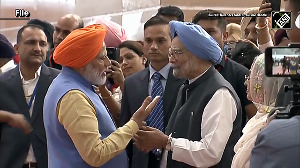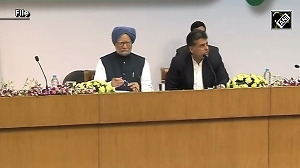Cementing their strategic partnership, India and Russia on Tuesday signed three agreements, including one on protection of intellectual property rights to regulate joint defence work.
The agreements were signed after one-to-one summit talks between Prime Minister Manmohan Singh and Russian President Vladimir Putin, following delegation-level parleys covering areas of India's requirement of civilian nuclear energy, cooperation in space sector and ways of enhancing bilateral economic and trade ties.
International terrorism and ways to combat it also figured prominently during the parleys. The agreements were signed in the presence of Dr Singh and President Putin after the talks.
Besides Russia's Federal Space Agency and ISRO signing an agreement on cooperation in the field of solar physics, India and Russia signed a Technology Safeguard Agreement to operationalise the 2004 pact on joint use of space-based Global Navigational Satellite System to provide for joint development of new generation navigational satellites.
One of the key agreements signed between the two sides was protection of intellectual property rights that will regulate joint defence work.
"India and Russia share the perspective to move towards collaborative defence projects, designs, develop and market next generation military products," Dr Singh said at the joint conference with Putin.
Putin said, "We have been successfully cooperating in nuclear energy and the Kudankulam nuclear power project is an example. We see India taking necessary steps to build relations with the Nuclear Suppliers Group."
He added that India is separating military and civilian nuclear programmes and has adopted the necessary legislations, apart from actively working with NSG countries.
"We consider India our strategic partner. We would work to ensure that India could cope with the tasks and goals it has set in the peaceful use of nuclear energy," he said.
Putin was asked if there was any legal constraints in selling certain nuclear equipment to India and said - "We hope Russia will have the opportunity to participate in India's efforts towards peaceful use of nuclear power."
Dr Singh, who along with Putin, witnessed the signing of the agreements, said the two countries have identified the Medium-Range Transport Aircraft and the Fifth Generation Aircraft as colloborative projects and discussion at the expert level would be held on them.
"We had serious discussions on international and regional politics. Our approaches to resolve the problems are the same," Putin said.
He said Russia and India firmly believe in building a multi-polar system of international relations. Asked about trilateral cooperation between India, Russia and China, Putin said the three nations were interested in establishing peace and stability in the Asian region.
"We maintain active cooperation in bilateral, trilateral and multilateral fora. Our mechanism for cooperation on major international issues has been growing including at the ministerial level," he said.
On the same question, Dr Singh said these three countries were the fastest developing economies of the world 'and, therefore, we believe there is enormous scope for cooperation between them'.
About the Iran-Pakistan-India gas pipeline project, Dr Singh said India's need for commercial energy were growing.
"As most of these requirements were being met through imports, the dependency on foreign sources will increase. Therefore, we are utilising the gas available in the neighbourhood. If countries in the region can get together, then this problem will be resolved," he said.
Putin said Russian experts were not only looking at constructing the Iran-India pipeline but also other gas pipelines in the region. The Sakhalin-I project, in which India has made major investment, involved a total amount of about $10 billion.
"Today India has expressed interest in developing this project as well as participating in similar projects," he said. Therefore, there is every reason to expect that there are more joint projects to follow, Putin said.
On Iran nuclear issue, Putin said Russia hoped that Tehran would fulfil all required international obligations on its atomic programme.
"The International Atomic Energy Agency has the potential to resolve the issue and all the possibilities have not yet been exhausted. Dialogue is going on with all the countries concerned," Singh said and added that the matter could be resolved satisfactorily within the ambit of the IAEA.






 © 2024 Rediff.com -
© 2024 Rediff.com -